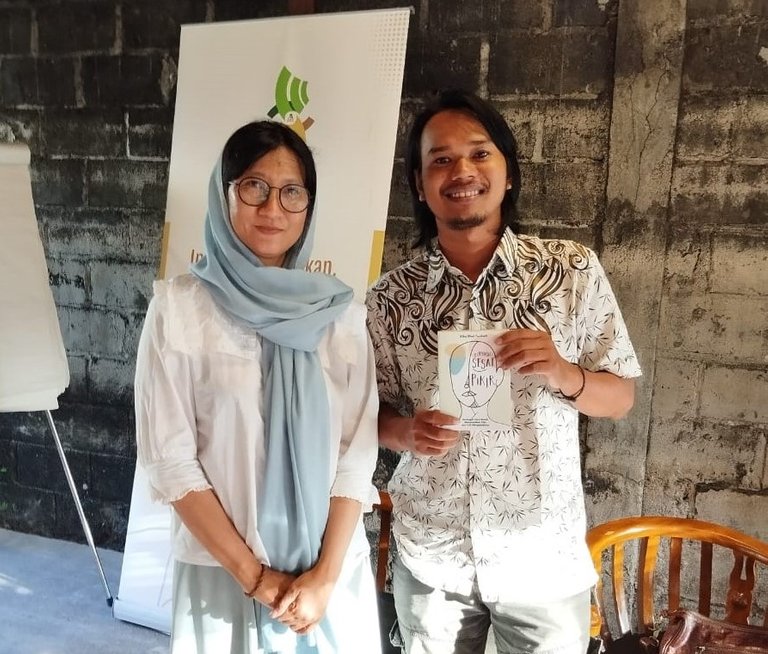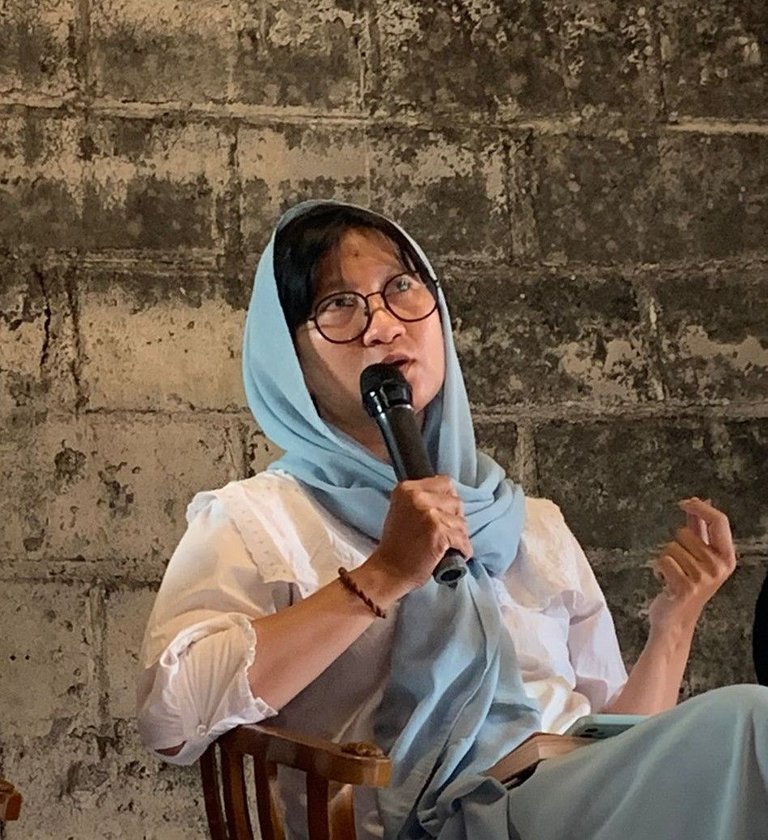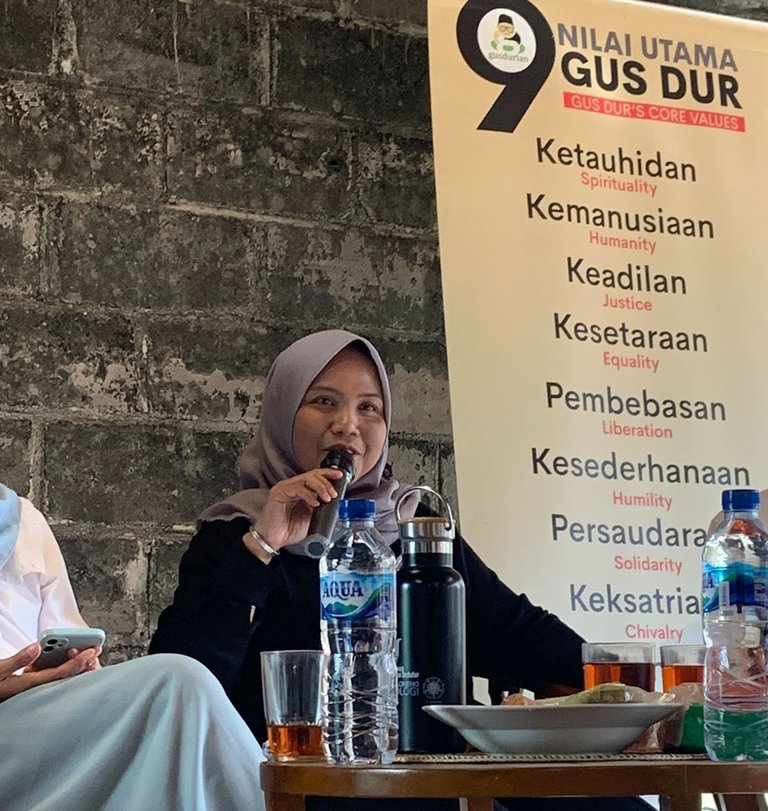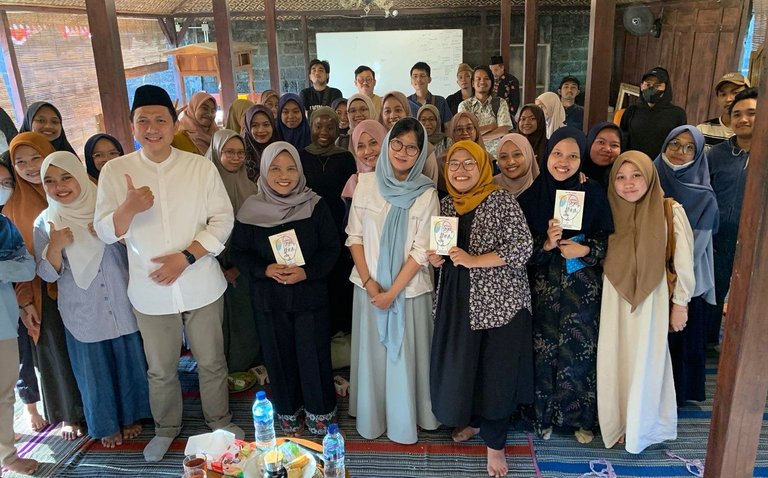Humans are unique creatures that not only have physical dimensions, but also intellectual and spiritual dimensions. Among the characteristics that distinguish humans from other creatures is the presence of reason and conscience.
Having said that, have we ever wondered if all humans are truly endowed with intellect and conscience? Or are there some who lack them?
In our daily lives, we frequently found friendly people, on the other hand, we as well find people who are so annoying, above all on social media. Why is that?

I ask for Rika Iffati Farihah, author of the book Menyiasati Sesat Pikir (Getting Around Misguided Thoughts), to answer this question.
I quote a number of Rika's opinions in the launching & Diskusi Buku (book review) organized by Aran Publishing in collaboration with Gusdurian Jogja and Fatayat NU, at Griya Gusdurian, Jl. Sorowajan, RT.08 / RW.RT 10, Jaranan, Banguntapan last Friday 28 July 2023.
Rika tells us how she wrote this book. At first, it came from a sense of curiosity about the countless people we see, especially on social media, there are people whose actions we think are unreasonable, irrational, and misguided thinking of all kinds.
"Then I thought, I wanna learn, why these people are like that. How do different humans think?" said Rika.

Rika's journey in writing this book led her to find many expert opinions in many kinds of literature, in the United States for example, the real fierce political battles between the camps are as fierce as in Indonesia, the same as the cebong and kampret era ahead of the 2019 presidential election.
In the beginning, Rika shared it in her circle, and after a while, it seemed interesting that more people knew about it, so this book was born.
Where is the location of intellect (mind), where is the conscience (inner voice)?
Everything that happens to us has a center that regulates anything, namely in the brain, even what we often call feelings, emotions, and even conscience. The so-called emotion is the main source of the brain.
We used to like to distinguish between emotions and logic, even though all decision-making has emotions. We would always involve feelings in every decision, every mental process.
Due to this, humans have their social conditions, and sometimes they might not be able to process things as they should, above all in the era of social media that is full of disruptions and framing. The same information, when conveyed differently, could be received differently.
"That's the reason why I am more tolerant (when observing people acting and thinking irrationally)," Rika added.

Nur Rofiah, a panelist in this discussion, as well gave shared her perspective on the connection between serious psychological theories and daily life in the context of the book.
The book provides us with a way to see a thinking pattern, a pattern to respond to issues that are not just applicable to the events exemplified in daily life but as well to serious events such as interpreting the Quran.
The author of the book Nalar Kritis Muslimah gives an example of how the system of thinking in Islamic scientific studies is held hostage due it sees men as economic beings.
Later on, it could mislead such a way of thinking so that men are only valuable if they have money, and if he lacks it, he is disregarded.
And on the other hand, women are often regarded merely as objects of sexual desire and reproductive machines. What if she is beautiful then she is valuable. Their worth is judged based on their physical appearance, with attractiveness being the determining factor.
"It has been centuries until nowadays, such thinking patterns are still deeply ingrained," said Nur.
Human beings are intelligent beings, both men and women. This intellect is well what distinguishes humans from animals.
The next fallacy in thinking is viewing women as a source of temptation. But who determines whether women cause temptation or not? Who else but men? Where does this perception come from? It arises from their sexual potential.
This book (Menyiasati Sesat Pikir) invites us to criticize our way of thinking, both personally and collectively as Muslims.
"I firmly assert that the Quran is from Allah, and there could be no misguided thinking within the Quran. Allah is free from any misguided thoughts or intentions to lead us astray," Nur emphasized.
"But when it comes to interpretation (tafsir), it comes from humans. And humans could have misguided thinking, even more when it concerns women's issues," Nur continued.
To strengthen her argument, Nur highlighted two theories discussed in the book. The first one is the Cognitive Dissonance Theory (CDT) introduced by Leon Festinger. This could be linked to the trap of thinking that frequently occurs in gender-biased interpretations of the Quran.
When interpreting the Quran from a gender justice perspective (fairness for both men and women), men might experience cognitive dissonance and fear that it contradicts Allah's teachings.
In fact, what is being challenged is the interpretation that has been voiced more by men, which makes women vulnerable to stigmatization, marginalization, subordination, violence, and a double burden just for being women.
The second theory is the Bias Blind Spot theory introduced by Emily Pronin. It suggests that while we criticize others, we should also critique ourselves to avoid falling into a logical fallacy.
This is done by recognizing our way of thinking, recognizing the pitfalls of misguided thinking, and then developing it into something productive for the maslahah (المصلحة).
Everybody is given a mind, but not everyone uses their mind well so that their actions are beneficial to themselves and others.
As humans, we are born as intellectual beings and are granted conscience. The conscience constantly speaks of the well-being of all, leading us to be spiritual beings, tasked with being khalifah fil ardh (فِي الْأَرْضِ خَلِيفَةً) and demonstrating the utmost maslahah to all living beings.
If we utilize our intellect wisely, the maslahah of our actions can transcend our lifetimes. Take Thomas Alva Edison, for instance; the light bulb he invented continues to be maslahah us even today, and its impact will endure as long as the world keeps turning.

When we reach such a stage, we will return to Allah as tranquil souls, an nafsul mutmainnah (النَّفْسُ الْمُطْمَىِٕنَّةُۙ). It is to be hoped that, this book could accompany us on our journey to become enlightened beings with rational minds [mhg].
Congratulations @iamaheng! You have completed the following achievement on the Hive blockchain And have been rewarded with New badge(s)
Your next target is to reach 20 posts.
You can view your badges on your board and compare yourself to others in the Ranking
If you no longer want to receive notifications, reply to this comment with the word
STOPCheck out our last posts: